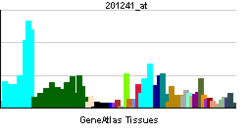DDX1
| View/Edit Human | View/Edit Mouse |
ATP-dependent RNA helicase DDX1 is an enzyme that in humans is encoded by the DDX1 gene.[3][4]
DEAD box proteins, characterized by the conserved motif Asp-Glu-Ala-Asp (DEAD), are putative RNA helicases. They are implicated in a number of cellular processes involving alteration of RNA secondary structure such as translation initiation, nuclear and mitochondrial splicing, and ribosome and spliceosome assembly. Based on their distribution patterns, some members of this family are believed to be involved in embryogenesis, spermatogenesis, and cellular growth and division. This gene encodes a DEAD box protein of unknown function. It shows high transcription levels in 2 retinoblastoma cell lines and in tissues of neuroectodermal origin.[4]
Interactions
DDX1 has been shown to interact with HNRPK.[5]
References
- ↑ "Human PubMed Reference:".
- ↑ "Mouse PubMed Reference:".
- ↑ Schmid SR, Linder P (Apr 1992). "D-E-A-D protein family of putative RNA helicases". Mol Microbiol. 6 (3): 283–292. doi:10.1111/j.1365-2958.1992.tb01470.x. PMID 1552844.
- 1 2 "Entrez Gene: DDX1 DEAD (Asp-Glu-Ala-Asp) box polypeptide 1".
- ↑ Chen, Hui-Chin; Lin Wei-Chin; Tsay Yeou-Guang; Lee Sheng-Chung; Chang Ching-Jin (Oct 2002). "An RNA helicase, DDX1, interacting with poly(A) RNA and heterogeneous nuclear ribonucleoprotein K". J. Biol. Chem. United States. 277 (43): 40403–40409. doi:10.1074/jbc.M206981200. ISSN 0021-9258. PMID 12183465.
Further reading
- Li L, Li HS, Pauza CD, et al. (2006). "Roles of HIV-1 auxiliary proteins in viral pathogenesis and host-pathogen interactions". Cell Res. 15 (11–12): 923–934. doi:10.1038/sj.cr.7290370. PMID 16354571.
- Godbout R, Squire J (1993). "Amplification of a DEAD box protein gene in retinoblastoma cell lines". Proc. Natl. Acad. Sci. U.S.A. 90 (16): 7578–7582. doi:10.1073/pnas.90.16.7578. PMC 47185
 . PMID 7689221.
. PMID 7689221. - Kitajima Y, Yatsuki H, Zhang R, et al. (1994). "A novel human homologue of a dead-box RNA helicase family". Biochem. Biophys. Res. Commun. 199 (2): 748–754. doi:10.1006/bbrc.1994.1292. PMID 8135819.
- Akiyama K, Akao Y, Yokoyama M, et al. (1999). "Expression of two dead box genes (DDX1 and DDX6) is independent of that of MYCN in human neuroblastoma cell lines". Biochem. Mol. Biol. Int. 47 (4): 563–8. doi:10.1080/15216549900201603. PMID 10319407.
- Golembowski S, Gellrich S, von Zimmermann M, et al. (2000). "Clonal evolution in a primary cutaneous follicle center B cell lymphoma revealed by single cell analysis in sequential biopsies". Immunobiology. 201 (5): 631–44. doi:10.1016/s0171-2985(00)80080-7. PMID 10834319.
- Bléoo S, Sun X, Hendzel MJ, et al. (2002). "Association of human DEAD box protein DDX1 with a cleavage stimulation factor involved in 3'-end processing of pre-MRNA". Mol. Biol. Cell. 12 (10): 3046–59. doi:10.1091/mbc.12.10.3046. PMC 60154
 . PMID 11598190.
. PMID 11598190. - Andersen JS, Lyon CE, Fox AH, et al. (2002). "Directed proteomic analysis of the human nucleolus". Curr. Biol. 12 (1): 1–11. doi:10.1016/S0960-9822(01)00650-9. PMID 11790298.
- Chen HC, Lin WC, Tsay YG, et al. (2002). "An RNA helicase, DDX1, interacting with poly(A) RNA and heterogeneous nuclear ribonucleoprotein K". J. Biol. Chem. 277 (43): 40403–40409. doi:10.1074/jbc.M206981200. PMID 12183465.
- Strausberg RL, Feingold EA, Grouse LH, et al. (2003). "Generation and initial analysis of more than 15,000 full-length human and mouse cDNA sequences". Proc. Natl. Acad. Sci. U.S.A. 99 (26): 16899–16903. doi:10.1073/pnas.242603899. PMC 139241
 . PMID 12477932.
. PMID 12477932. - Gerhard DS, Wagner L, Feingold EA, et al. (2004). "The status, quality, and expansion of the NIH full-length cDNA project: the Mammalian Gene Collection (MGC)". Genome Res. 14 (10B): 2121–2127. doi:10.1101/gr.2596504. PMC 528928
 . PMID 15489334.
. PMID 15489334. - Fang J, Kubota S, Yang B, et al. (2005). "A DEAD box protein facilitates HIV-1 replication as a cellular co-factor of Rev". Virology. 330 (2): 471–480. doi:10.1016/j.virol.2004.09.039. PMID 15567440.
- Krishnan V, Zeichner SL (2006). "Alterations in the expression of DEAD-box and other RNA binding proteins during HIV-1 replication". Retrovirology. 1: 42. doi:10.1186/1742-4690-1-42. PMC 543576
 . PMID 15588285.
. PMID 15588285. - Andersen JS, Lam YW, Leung AK, et al. (2005). "Nucleolar proteome dynamics". Nature. 433 (7021): 77–83. doi:10.1038/nature03207. PMID 15635413.
- Fang J, Acheampong E, Dave R, et al. (2005). "The RNA helicase DDX1 is involved in restricted HIV-1 Rev function in human astrocytes". Virology. 336 (2): 299–307. doi:10.1016/j.virol.2005.03.017. PMID 15892970.
- Rual JF, Venkatesan K, Hao T, et al. (2005). "Towards a proteome-scale map of the human protein-protein interaction network". Nature. 437 (7062): 1173–1178. doi:10.1038/nature04209. PMID 16189514.
- Kaneko S, Ohira M, Nakamura Y, et al. (2007). "Relationship of DDX1 and NAG gene amplification/overexpression to the prognosis of patients with MYCN-amplified neuroblastoma". J. Cancer Res. Clin. Oncol. 133 (3): 185–192. doi:10.1007/s00432-006-0156-y. PMID 17028906.
- Tu LC, Yan X, Hood L, Lin B (2007). "Proteomics analysis of the interactome of N-myc downstream regulated gene 1 and its interactions with the androgen response program in prostate cancer cells". Mol. Cell Proteomics. 6 (4): 575–588. doi:10.1074/mcp.M600249-MCP200. PMID 17220478.
